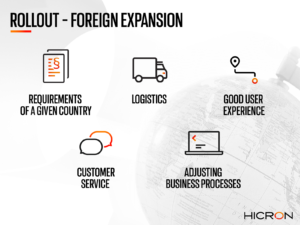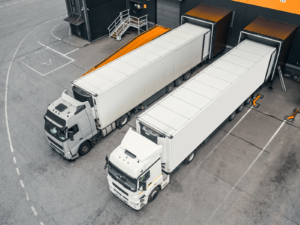Opening an online store on a foreign market is a milestone in the growth of any business, as it provides an opportunity to significantly expand the audience for its products and increase brand recognition internationally. If you want to be successful both on domestic and foreign markets, you should thoroughly plan the process of implementing online sales and, consequently, an e-commerce platform that will support this model.
How to start selling abroad, or rules of a successful rollout

When it comes to rolling out an online store in another country, the most common actions can be divided into four groups:
- ensuring the operation of the store in accordance with the requirements of the legislation of a given country,
- ensuring efficient logistics and deliveries within the country,
- ensuring good user experience, known as e-commerce platform localization,
- customer service (including after-sales – warranty and returns),
and, if necessary:
- adjusting business processes (sales and distribution) in internal ERP IT systems.

Preparing the company for the rollout
Based on the above points, it is easy to see that knowledge of one’s own local market, its needs, and a plan to implement an e-commerce platform there is not enough for a company planning to open a similar store in another country. Even if e-commerce works successfully in one place based on accepted principles, it does not mean that it will work in the same way elsewhere.
According to Clotaire Rapaille, a renowned market researcher, when we try to introduce something new and previously unknown to a given culture, we must first adapt it to that culture. Otherwise, the chances of its adoption are close to zero.[1]
When launching a sales site in another country, it is necessary to properly plan this endeavor from the administrative (process) side, but also in terms of the website made available to Customers (user experience). Below we present some of the most important aspects for the rollout of an online store.
Legal obligations
This aspect may seem obvious, but many doubts can arise when researching the market the company plans to enter. Entrepreneurs should pay particular attention to the regulations and standards that their businesses should follow during a rollout. If an organization is already operating on a given foreign market, it should still consult with legal and financial professionals about the specific requirements that an online store must meet. One example is how and when Customers can return purchased goods. Based on this knowledge, the terms and conditions of the online store and the contract for the sale of goods and services are created and made available to buyers through the store.
Logistics conditions
This is important both from a business perspective and for the store rollout itself, as it may be associated with additional functional changes within the platform. Much depends on the size of the organization. The first issue is the approach to storing the goods sold, i.e. whether the company will decide to build warehouses in foreign countries, from which the goods will be shipped to the local Customers, or whether the goods will be transported from abroad after an order is placed.
The second issue is the very process of delivering the goods to the buyer, known as last mile delivery. Delivery time, especially in relation to popular products, is important in building a competitive advantage. But fast delivery is just one thing. Meeting the delivery dates and the ability to track shipments are other factors in winning loyal Customers. When starting online sales in a new country, it is necessary to choose the right delivery methods and, as a result, establish cooperation with companies providing transportation services. From a technical point of view, it is also crucial to ensure the integration of the store with the IT systems of these companies, so that the delivery process is started automatically once an order is confirmed, to optimize the delivery time as much as possible.
For example, according to statista.com, in Germany the three most popular delivery methods are: DHL Deutsche Post (available in 76% of online retailers in 2022), followed by Click & Collect, Hermes (25% each) [Statista.com, Shipping method offered by online retailers in Germany 2022]. In Poland, on the other hand, the most popular delivery methods are parcel lockers (81%), courier or post (16%), and click & collect (8%).[2]
It is worth mentioning that, depending on the specifics of the business, it may be necessary to consider specialized transportation (for example, in the case of delivery of bulky products or chemicals) or to ensure same-day delivery, as in the case of food products.

Consumer needs related to the shopping process in an online store
Successful implementation of e-commerce in a foreign market will certainly be more likely after conducting an analysis of its needs. This applies, as before, to purely business decisions. In this case, it is important to consider which products have a chance of achieving high sales, whether there is a niche on the market that our company can fill, and how to build a competitive advantage.
It can be achieved by implementing an online store shopping process that is as Customer-friendly as possible. According to a study by Dimensional Research for tech companies on consumer behavior, as many as 58% of consumers stop shopping after a negative shopping experience. For this reason, it is worth examining and adapting the online store to the needs of Customers on the target market, e.g. in terms of:
- customer flow – for example: whether to enable shopping without registration (so-called quick checkout),
- professional translation of the online store and all subpages, product descriptions, attachments, as well as automatic communication with the Customer,
- payment methods – as in the case of logistics, you should research the most popular methods in a given country and ensure the safe integration of your store with payment providers and the company’s accounting system.

Local customer service = ensuring the best possible customer service
This is an extremely important part of operating on a foreign market. Referring to the above-mentioned statistics, the customer service of an e-commerce platform is crucial and often determines the experience of the customers using it to make purchases. This is why ensuring its high quality in a store operating at the Customer’s location is a must. It is also important to make sure that, after rollout, the e-commerce platform meets the standards of the local stores. Admittedly, the idea behind online stores is to automate sales-related processes and enable buyers to make purchases on their own, without having to contact staff. Still, there are cases (usually referred to as “difficult situations for customers or potential customers”) when support is necessary and solutions such as FAQs or chat bots are insufficient. The company should then ensure that appropriate service is provided to the buyers locally, whenever possible. It is also a necessary condition to enable it in the customer’s language. Then, even if the goods are returned, with proper and efficient service, there is a chance that the consumer will not choose a competing offer in the future.
Previously used solutions
When implementing an online store in another country, it is also important to consider which of the tools previously used to create and maintain the original platform can be used for the rollout. This includes, for example, the websites on which the online store was built in the primary locations or any intermediary platforms for sales or shipping. It is likely that many of them will prove useful and there will be no need to replace them with other solutions. In turn, some may require additional extensions or complete replacement.
Employee engagement
A rollout is a major challenge for companies. It engages most of their departments, and thus – many employees. This means that, at some stage, some of them will be given additional responsibilities and will even need to be further trained and specialized. This generates not only costs, but also the need to change documentation, such as contracts. In addition, when implementing an e-store in a foreign location, teams and employees responsible for specific stages of the process should be designated. Therefore, it is extremely important to thoroughly analyze the competences of the organization’s members and, if necessary, use the support of external companies. A good solution in this case would be a company that provides outsourced customer service in a particular country, in that country’s language.

Financial resources
For any large project, managers should develop a financial strategy to realistically determine the risks and returns that such a project may bring. It is no different when implementing e-commerce abroad. Based on the aforementioned elements, a rollout plan should assume a budget and time to implement appropriate adjustments to the needs of a given market, such as performing translations and ensuring their consistency, implementing market-specific functionalities (such as the aforementioned quick checkout), and integrating with the systems of transportation companies or online payment operators.
It is also important to adjust the sales and distribution processes in SAP-type systems if the company has not previously operated in the territory of a given country.
Competitors
When entering a foreign market, one should first look at similar e-commerce platforms already in place. Comparison of offers, visual identities, narratives, menu layouts, delivery options, special offers – all this allows you to build an idea of the customers, market, and shopping trends. In-depth research will also provide information on how to adjust prices to the new store, what quality customers are looking for, and what range of products and services to offer them. Studying your competitors’ strategies will also help you determine proven sales techniques, as well as develop your own unique ways to reach buyers.
Hicron’s support you can count on
Every rollout is a major challenge and test for the company. If you want to reach the point of opening an online store abroad, you need to plan this process in detail, test specific possibilities, tools, and build the entire strategy. This undertaking may be beyond the company’s capabilities, but it is also a great opportunity to build a stable position on the international arena. With the support of experienced and trustworthy specialists, this process can be carried out with total control and security for the organization. Our many years of implementation and business experience mean that we are ready to support companies at various stages of the endeavor. Looking for a trusted partner to guide your organization through the process of implementing an e-commerce platform abroad? Contact Hicron e-commerce experts!
[1]Clotaire Rapaille, The Cultural Code
[2]Gemius study, E-commerce report 2022.
Sources:
Clotaire Rapaille, The Culture Code: An Ingenious Way to Understand Why People Around the World Buy and Live as They Do, Brodway Books, New York City, 2007.
Gemius, E-commerce report 2022,
Statista, Shipping method offered by online retailers in Germany 2022,
https://www.zendesk.com/blog/customer-service-and-lifetime-customer-value/.





